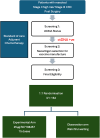Current and future genomic applications for surgeons
- PMID: 38555869
- PMCID: PMC10981988
- DOI: 10.1308/rcsann.2024.0031
Current and future genomic applications for surgeons
Abstract
Genomics is a crucial part of managing surgical disease. This review focuses on some of the genomic advances that are available now and looks to the future of their application in surgical practice. Whole-genome sequencing enables unbiased coverage across the entire human genome of approximately three billion base pairs. Newer technologies, such as those that permit long-read sequence analysis, provide additional information in longer phased fragment and base pair epigenomic (methylomic) data. Whole-genome sequencing is currently available in England for cancers in children, teenagers and young adults, central nervous system tumours, sarcoma and haematological malignancies. Circulating tumour DNA (ctDNA), immunotherapy and pharmacogenomics have emerged as groundbreaking approaches in the field of cancer treatment. These are now revolutionising the way oncologists and surgeons approach curative cancer surgery. Cancer vaccines offer an innovative approach to reducing recurrence after surgery by priming the immune system to trigger an immune response. The Cancer Vaccine Launch Pad project facilitates cancer vaccine studies in England. The BNT122-01 trial is recruiting patients with ctDNA-positive high-risk colorectal cancer after surgery to assess the impact of cancer vaccines. The evolving landscape of cancer treatment demands a dynamic and integrated approach from the surgical multidisciplinary team. Immunotherapy, ctDNA, pharmacogenomics, vaccines, mainstreaming and whole-genome sequencing are just some of the innovations that have the potential to redefine the standards of care. The continued exploration of these innovative diagnostics and therapies, the genomic pathway evolution and their application in diverse cancer types highlights the transformative impact of precision medicine in surgery.
Keywords: cancer vaccine; genetics; genomics.
Figures



References
-
- Future of Surgery Commission. Future of Surgery. London: RCS England; 2018.
-
- McDermott FD, Newton K, Beggs AD, Clark SK. Implications for the colorectal surgeon following the 100 000 Genomes Project. Colorectal Dis 2021; 23: 1049–1058. - PubMed
-
- Larkin J, Chiarion-Sileni V, Gonzalez Ret al. . Five-year survival with combined nivolumab and ipilimumab in advanced melanoma. N Engl J Med 2019; 381: 1535–1546. - PubMed
Publication types
MeSH terms
Substances
LinkOut - more resources
Full Text Sources
Medical

